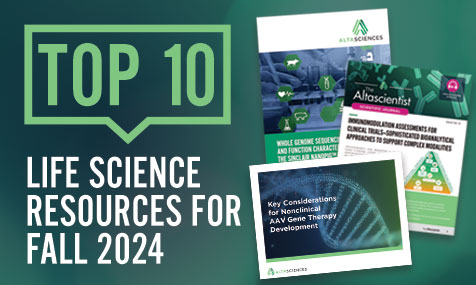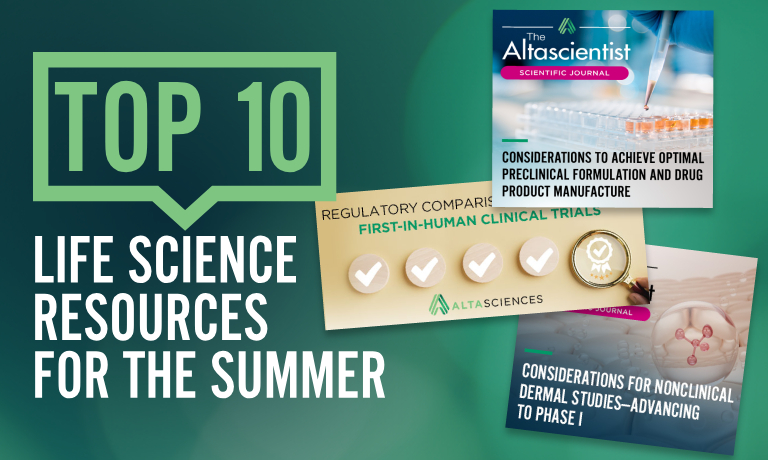Four Key Steps to Optimizing a Large Molecule Bioanalytical Program
Biologics are large, complex molecules that can undergo structural changes during the manufacturing process, storage, or administration to patients. This means bioanalysis of biologics is a critical aspect of the drug development process, and one that requires sensitivity, specificity, and selectivity.
A major consideration of any bioanalytical endpoint is translatability from preclinical to clinical trials. Planning the assays that best enable appropriate pharmacokinetic, pharmacodynamic, and toxicokinetic assessments—and translate throughout preclinical to clinical human trials—is crucial. Critical assessments to consider for a large molecule program include biologic quantitation, immunogenic response assessment, cell-based functional assays, and biomarkers.
Here are four steps to help ensure that your large molecule program is fully optimized to deliver the decision-making data that you need:
1. Planning the Roadmap for the Bioanalysis of Your Biologics
As soon as a lead candidate is identified and toxicology studies are envisioned, large molecule bioanalytical support discussions and strategy should be outlined with internal and external stakeholders to ensure smooth progression, whether for assay transfers or de novo assay development. Common points to address are:
- Assessment of expected challenges based on the drug product
- Study requirements to consider during method development
- Availability and stability of critical reagents for the duration of the program
- Cross-reactivity of reagents between species (when applicable)
- Sensitivity requirements for the assay based on study needs and regulatory guidance
Timely generation of a positive control antibody for immunogenicity testing is also an important consideration.
The inter-dependence of the preclinical and clinical design with bioanalysis is paramount, as translatability of appropriate assays, data, and biomarkers must be investigated and confirmed to ensure the bioanalytical plan fully supports the studies, and delivers the data needed to advance the drug development to later phases. If the bioanalytical plan is not well aligned with the preclinical and clinical trial designs, the data collected may not fully characterize your molecule for regulatory purposes. If this occurs, the regulatory agencies will request additional assessments. Unplanned bioanalytical assessments imply delays and increased costs, sometimes significant, for your drug development program.
2. Undertaking Biologics Method Development and Assay Transfers
During discovery, research grade assays set to establish proof of concept could be the building blocks for method development that can be transferred to the bioanalytical laboratory. Early drug quantitation assays used in discovery that do not meet regulatory guidance for GLP studies can be optimized or modified for validation to support preclinical and clinical studies. Biomanufacturing characterization assays can be adapted to support pharmacodynamics or immunogenicity assessment for a clinical study. For example, cell-based potency assays can be the building blocks to developing a neutralizing cell-based assay to characterize the immune response generated against the drug product.
3. Allocating Resources for the Assay Development of Biologics
When allocating resources for assays, it is important to distinguish between the data you need and the potentially nonessential data you would like to have. If resources are limited, focus on the necessary data required for your IND submission, or that will facilitate later-phase human studies. A knowledgeable, integrated bioanalytical team can provide invaluable scientific and regulatory guidance, saving you time and money. Moreover, when specific regulatory guidance is not available—as is the case for some new classes of biologics—an experienced provider can offer expert guidance on choices of bioanalytical platforms and fit-for-purpose assay validation criteria.
4. Choosing a Large Molecule Bioanalytical Partner
Careful selection of an expert partner can provide advantages in efficiency, effectiveness, and acceleration of your biologic drug development program. Altasciences’ experience in supporting biologics and vaccine development allows you to benefit from a broad portfolio of expertise with a range of modalities—including proteins, peptides, antibodies, protein drug conjugates, multifunctional biologics (such as bispecifics), oligonucleotides, and gene therapy—to allow effective development from preclinical to clinical studies.
Supported by solutions that span the entire drug development process, we have the capabilities and expertise to deliver the bioanalytical support you need.



